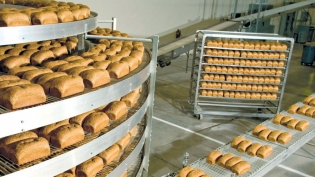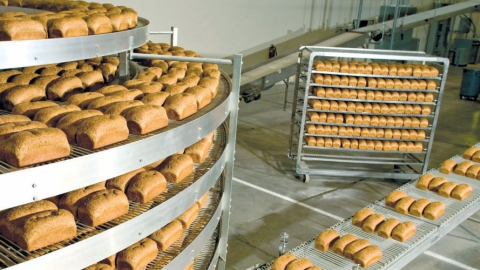Friends in Knead at Alvarado Street Bakery
Worker-Owner Co-op Model Thrives at Alvarado Street Bakery
Baking is a job for early-risers like Miguel Calderon. It’s before 5am and the first shift of the bagel production crew is waking up, leaving their families sleeping peacefully at home.
The sun rises over Petaluma’s hills as Calderon joins the team mixing dough and sending fluffy golden rings down the line to be packaged. He’s been working on the production floor for seven years. At most bakeries in the country it’s likely he would be making around $12 an hour. But his salary hovers around $60,000 per year, on top of stellar health insurance, a 401(k) and a share of the bakery’s profits.
“I’ve worked here since I was 19 years old,” he said. “When I was in high school I was the manager at Taco Bell. I worked in construction, a car wash, restaurants, sometimes I had two jobs at once. I changed my work drastically with this job. Compared to other jobs, this company cares about the people that work here.”
Calderon works at Petaluma’s Alvarado Street Bakery, the largest worker-owned bakery cooperative in the United States. The business began in the 1970s when a small wave of consumer and worker cooperatives swept the Bay Area, only some of which continue today.
The Red Clover Worker’s Brigade was a nonprofit commune with produce stand, store, one truck and an oven. In 1980, five of the brigade members formed a workers’ cooperative, pulled together $5,000 and acquired the bakery as a separate business.
Since the start, Alvarado found its niche producing sprouted bread, a process that uses sprouted whole wheat berries instead of dry flour to make nutrient-rich dough. In the early days, sourcing whole organic grains required a drive to Los Angeles, and it was on one of those rides that the driver fell asleep, crashing into the sign for Alvarado Street in Venice. The sign was hastily thrown into the truck and hung over the bakery oven back at home. The name stuck.
Today, the sign marks the entrance to Alvarado’s 70,000 square foot facility that produces about 50,000 loaves of bread per day. The business pulls in $33 million in annual sales and “employs” 120 worker-owners.
“We started as a little hippie business selling organic whole grain bread in San Francisco when no one else was,” said Michael Girkout, company president. The little business has grown into a national leader in the organic bread market and a successful case study for worker democracy and cooperative business.
THE WORKER COOPERATIVE
If the word “cooperative” still conjures up images of hippie grocery stores for you, it’s time to think differently.
Cooperatives are an age-old business model, with the most modern iteration arising in England during the Industrial Revolution when a group of displaced weavers and other skilled workers banded together to cooperatively purchase basic food supplies they couldn’t afford otherwise. The principles that evolved out of that small grocery store are now the basis for cooperative operating principles everywhere.
Today, nearly 1 billion people worldwide are cooperative member-owners, representing a growing alternate economy with a diversity of consumer and worker-owned business models.
In the United States, there are currently approximately 30,000 cooperatives with a combined total of 900,000 member-owners. They range from credit unions to major food companies to electrical utilities to retail outlets.
There are two central concepts that define a worker cooperative: Worker-owners invest and own the business together, distributing the surplus among themselves, and decision making is democratic, with each member receiving one vote.
All worker cooperatives operate in accordance with the Cooperative Principles and Values adopted in 1995 by the International Co-Operative Alliance, seven principles based on self-help, self-responsibility, democracy, equity, equality and solidarity. But, no two cooperative are completely alike—because, after all, a cooperative is whatever its members want it to be.
THE ALVARADO MODEL
In the beginning, all decisions at Alvarado were made by consensus. The company was organized by committees, which represented departments (shipping, production, etc.), and the committees convened to make decisions.
“As we began to grow membership, meetings became a nuisance, we were all making minimum wage and didn’t have patronage dividends yet,” said Girkout. “We had to call people at home to come to meetings so we could get a quorum.”
Enter the new model. New being a relative term for an organization in which most employees have been around for over 15 years.
About 25 years ago, the Alvarado team invented a new governance structure resembling a corporate hierarchy: committees are now “areas,” with each area now supervised by an area coordinator, who, together with the other area coordinators, make up an advisory council that reports to a general coordinator (which somewhere else might be referred to as a CEO or general manager). The general coordinator reports to the board, which is made up of nine members with seats rotating every three years. Mechanisms ensure that departments and demographics are equally represented, and anyone can run for a seat.
Incestuous as it may sound, the system works. Worker-owners at Alvarado still each hold one share (called an A share), which grants them the right to vote on key business decisions. The number of shares doesn’t change depending on a worker’s hierarchy in the company, it’s always one vote per person.
Worker-owners vote on wages, benefits, the business plan and the budget, granting them the ultimate authority on major business decisions, but releasing them from the burden of day-to-day business management, so they can do their jobs.
“I was so impressed by the level of transparency and how that’s built into the structure of the business,” said Kevin Haslebacher, Alvarado’s current general coordinator, who started at the company in October of last year. Haslebacher is a specialty food veteran and he says that, although adjusting to a cooperative model has proved to be a steep learning curve, it’s an exciting one. “There’s so much exposure about finances and business decisions. That level of engagement is important when trying to move ahead because everyone has a stake in it.”
Attracting talent like Haslebacher would have been difficult without another significant shift in the bakery’s operations. Soon after implementing the new model, Alvarado overhauled its salary structure. Previously turnover was an issue as jobs all paid the same and often required odd bakery hours with no career ladder. In order to attract talent using competitive salaries, Alvarado came up with wage brackets for each position. These are evaluated every three years when the membership can vote to increase the salary range.
“We realized that while we valued each individually equally, it was time to value positions differently,” said Girkout.
Still, the salary difference between management and operational positions contrasts wildly to a typical for-profit company, where the ratio of executive to worker compensation ranges between 300 and 500 to one. At Alvarado it’s about five to one.
Of course, it’s the bakery’s profits that make a significant difference in overall income for workers.
Operating capital was hard to come by in the early years (a disadvantage for cooperatives is capital access: banks are hesitant to make loans and the legal cooperative structure doesn’t allow for outside investors). Worker-owners agreed to a lower common wage in order to keep money invested in the company. This kept costs at a minimum and generated the capital necessary to keep the business in operation. But it wasn’t until much later on that worker-owners saw the payback.
“Those individuals who stayed started to reap the harvest of all those early years of work and we finally got to a profitable state where we were able to cash in those B shares,” said Girkout.
The B share refers to the profits of the company divided equally among all members. Worker-owners have received profit shares steadily for about the last 18 years.
WORKER BENEFITS
Considering the equal profit sharing, a top-of-the-line health plan, monthly retirement contributions and a generous vacation package, it’s no wonder there’s practically no turnover at Alvarado. Word has gotten out and job openings are scarce and competitive. New hires require a nine-month vetting period by their peers, trainings and the starting investment (workers must purchase their A share, currently about $1500). Meanwhile, longtime workers are buying homes, sending their kids to college and enjoying a comfortable standard of living in Sonoma County.
Sitting in the Alvarado conference room feels like being in an alternate universe, some kind of shiny house miraculously still standing amidst the tornado of the widening income gap wreaking havoc on working families across the country. Really, it’s just a basic brown-carpeted, white board-walled room. But it is a working demonstration of an alternative economy, where democratically owned businesses do exactly what proponents argue they are intended to: create long-term stable jobs for their communities.
The United Nations declared 2012 the International Year of the Cooperative, launching efforts to grow cooperatives, influence policy and raise awareness. It’s no surprise that the campaign came right on the heels of the 2008 financial crisis. Cooperatives often make a resurgence in response to economic crisis when times are grim for workers.
While typical corporations are focused on maintaining value for their stakeholders in the face of an economic meltdown, a cooperative’s priority is maintaining employment for its workers. The economic recession may have heightened the competition with other bakeries on the shelves, but there were certainly no layoffs at Alvarado.
With this kind of job security the membership is clearly able to plan—together—for the long term. And success here is not just measured by profit, but by worker health and happiness, sustainability and community benefit.
MULTIPLE BOTTOM LINE
WORKER HEALTH
“The membership guides our values, so by nature of who we are we work towards certain goals,” said Jim Canterbury, Alvarado’s sales director. “For example, we have a value from a human standpoint that we enter and leave the bakery whole and healthy.”
The cost of insurance for the bakery has come down to an industry low this year, thanks to a company-wide safety campaign that allows it to budget for zero accidents. Every person on staff receives safety training, regardless of their position. Financial incentives have been built into the campaign as well: worker-owners are rewarded based on the risk exposure of their position and how much was saved in workers’ compensation over the prior year.
Worker-owners also see a quarterly bump in their pay if they’ve stayed healthy. Unused sick days accrue quarterly in paychecks, naturally called well-pay.
ENVIRONMENTAL SUSTAINABILITY
The bakery is checking boxes when it comes to environmental health, as well; they’re green, non-GMO and certified organic. Wheat comes from a consortium of family farms in Utah (little organic wheat is grown in California) and other ingredients are sourced locally when possible.
The 1,700 solar panels on the roof qualify Alvarado as the largest solar powered bakery in the country. Solar generates about 40% of their power needs. Inside the bakery, there’s a catalytic oxidizer that reduces emissions by 99%. The company’s vendor sustainability policy requires all purchasing decisions be made prioritizing suppliers who make efforts towards a greener supply chain.
The company recycles all of their packaging waste, composts bakery waste and reuses their giant grain bags. By doing that, Girkout says they keep more than 3,600 cubic yards of waste from reaching landfills—enough to fill more than 50 rail cars every year.
ACCESS TO HEALTHY FOODS
Why sprouted wheat bread? Two reasons. The first is that sprouting whole wheat to make dough retains nutrients not delivered via processed flour by increasing the bioavailability of vitamins and nutrients and adding to the digestibility of the bread.
Sprouted wheat also freezes better, making it easier to distribute product across larger distances. Today, Alvarado’s sprouted breads, bagels, pizza bread, buns and more make their way across all 50 states and to Japan, from small health food stores to Costco, and to school districts and hospitals.
Other brands have caught on (and the whole-wheat market has clearly flourished in the past decade), but Alvarado remains the most common sprouted loaf on grocery shelves, their often lower price tag making them a better bargain than most conventional breads.
Perhaps surprisingly, Alvarado refers to itself as a “lunch-bucket” cooperative, taking a relatively non-political stance on most issues, including whom they sell their bread to. Delivering healthy, organic bread to mainstream, middle class America is the mission. If that requires selling it to the likes of Walmart, then so be it.
“Further back I came to the bakery with an opportunity to sell bread to U.S. military commissaries. That was not popular with the membership, this was post-Vietnam and the reluctance to sell to the military was pretty strong here,” said Girkout.
“But I had to make the argument that this isn’t going just to soldiers with bayonets, we’re talking about families with kids who are shopping at the commissaries. It is the end user, people like you and me, who just want to buy good food. The store that they buy it from is not important, we just want to get it to them.”
SOLIDARITY
On the day I visited Alvarado I coincided with a group from the Bay Area’s first business academy for worker-owned enterprises. The Worker Coop Academy is a partnership between the Sustainable Economies Law Center and several other organizations including Project Equity and the East Bay Community Law Center. It’s a 12-week program with training on government, management and leadership for individuals actively starting, expanding or converting to cooperative businesses.
Ricardo Nuñez, cooperatives program director for the Sustainable Economies Law Center, said that the academy came out of an increasing demand for more cooperative education—the half-day trainings and legal consultations previously offered by the center weren’t enough.
“There’s a larger movement for economic democracy, and worker-ownership represents a pathway within that movement,” said Nuñez. “The Bay Area is home to more cooperatives than anywhere in the country, and there’s been a cry here for more support. We are answering that call by looking at alternatives that can create resilient local economies.”
That day, about 20 people sat in the conference room for a Q&A session with Girkout and Canterbury. Most of the attendees were currently working for or with cooperatives in some capacity, so they came loaded with comprehensive questions. What was supposed to be a two-hour session turned into three. The hands just kept sprouting up.









